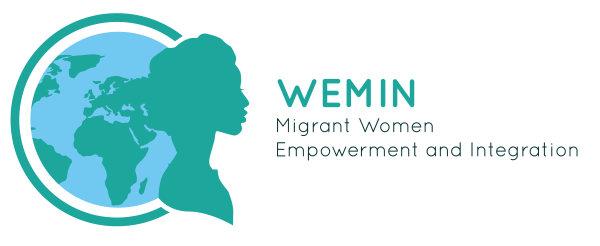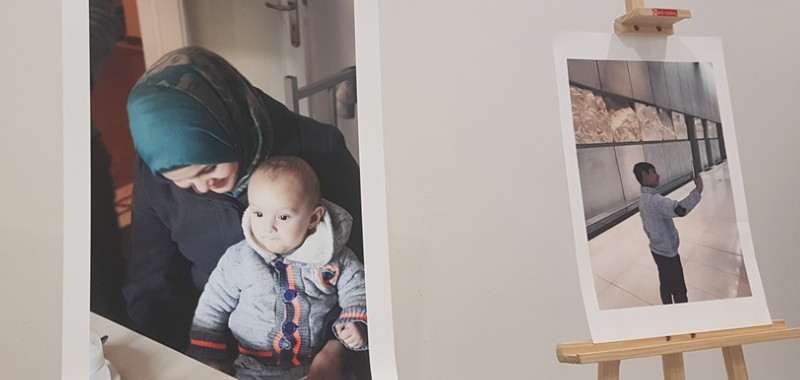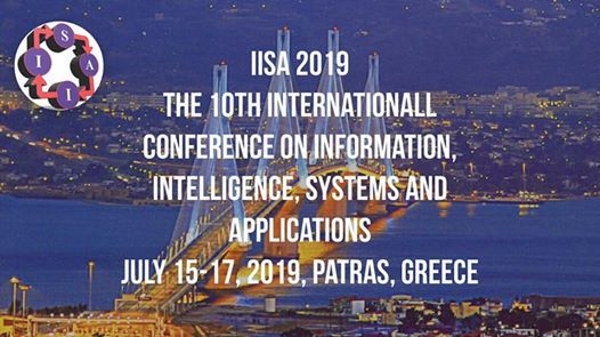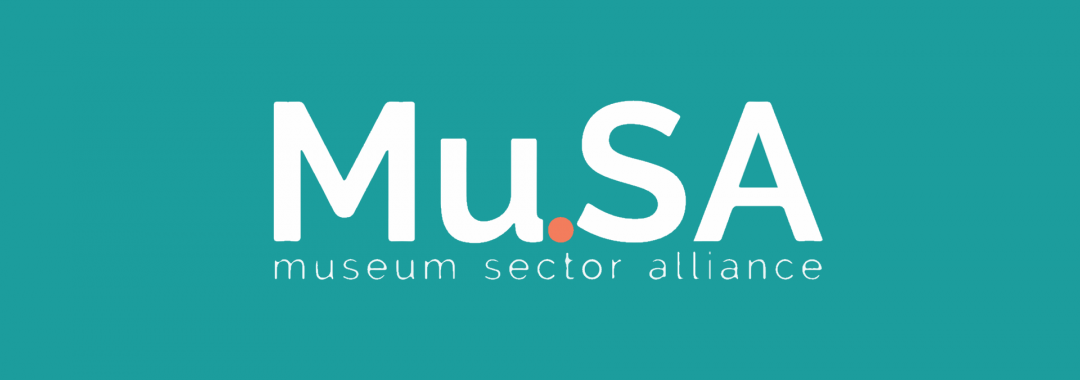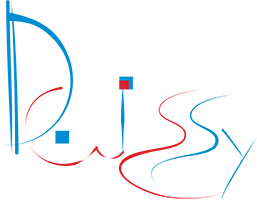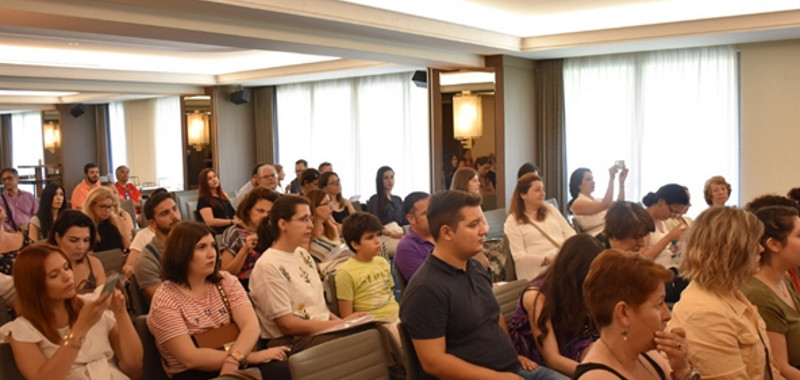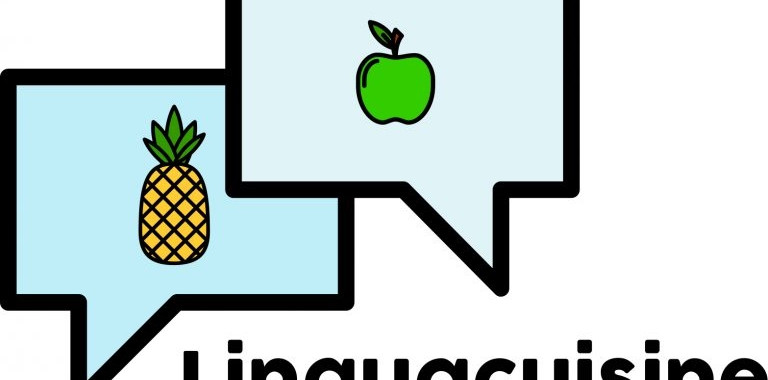MILE Wοrking Groups launched in Athens, Greece
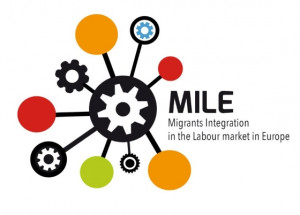 On 15th July 2019, the Hellenic Open University – DAISSy Research Group launched the operation of working groups (WG) of stakeholders involved in the implementation of “MILE: Migrants Integration in the Labour Market in Europe” project in Athens, Greece. Representatives of public and private organisations as well as NGOs and associations in the sectors of education, employment, provision of services for vulnerable groups, protecting human rights and tackling discrimination met and exchanged thoroughly on the broader field of immigration policy and related practices regarding labor market.
On 15th July 2019, the Hellenic Open University – DAISSy Research Group launched the operation of working groups (WG) of stakeholders involved in the implementation of “MILE: Migrants Integration in the Labour Market in Europe” project in Athens, Greece. Representatives of public and private organisations as well as NGOs and associations in the sectors of education, employment, provision of services for vulnerable groups, protecting human rights and tackling discrimination met and exchanged thoroughly on the broader field of immigration policy and related practices regarding labor market.
Initially, Professor Acilles Kameas, Director of HOU-DAISSy welcomed the participants and made a brief presentation of the MILE project, where the aims, objectives and activities were described. Questions from the participants were answered concerning the involvement of stakeholders in the project activities and the role of MILE Working Groups. The session continued with a presentation of the survey results from Assoc. Professor Bill Vassiliadis, MILE project manager. The overall aim of the research was presented, and the tools-techniques used for conducting the survey were also briefly discussed. Emphasis was put at the major findings of the survey in the categories of Third Countries Nationals (TCN) hiring, employing, TCN job profiles and employers’ needs. Special focus was done mainly on the results from the Greek sample compared with the trends of the findings of the surveys completed in the other project countries.
Then the stage was set for the next session which included the initial discussion about the main research questions of the WG activities. A more in-depth presentation about how the WG are going to function and what is expected by their members, took place. The discussion was vivid and very fruitful remarks were raised to be further explored within the WG on-going performance. Overall, the participants expressed their interest in participating and contributing to the project through the WGs and future actions to be scheduled in autumn 2019.
A respective report of the meeting has been conducted by HOU-DAISSy, MILE project partner and has been sent to the ICEI (IT)-Coordinator, as a project deliverable.
For more info about “MILE: Migrants Integration in the Labour Marketin Europe” project, please visit its site and facebook page
To access the Voices of the European Employers Report, visit: https://projectmile.eu/2019/07/31/find-out-mile-research-results/
ICPEC – Call For Papers
![]() Computer programming is a fascinating area, but at the same time, complex. In the teaching-learning process, teachers face many difficulties to find techniques and methodologies to facilitate the learning of programming languages and to foster problem-solving skills. At the same time, students find it difficult to understand the subjects and do not feel motivated to continue pursuing their studies and get good grades.
Computer programming is a fascinating area, but at the same time, complex. In the teaching-learning process, teachers face many difficulties to find techniques and methodologies to facilitate the learning of programming languages and to foster problem-solving skills. At the same time, students find it difficult to understand the subjects and do not feel motivated to continue pursuing their studies and get good grades.
ICPEC aims to be a space frequented by teachers and researchers to discuss topics that promote new methodologies, best practices, trends, techniques and tools to improve the teaching-learning process of computer programming.
Read more here!
The project V4T – Videogames for Teachers has launched its first two Intellectual Outputs!
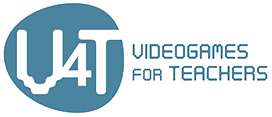 – Do you want to get informed about videogames and apps that are either educational or have strong educational potential? If yes, check the 120 records and corresponding reviews on the V4T online repository of videogames and mobile apps that has been developed in the context of the project.
– Do you want to get informed about videogames and apps that are either educational or have strong educational potential? If yes, check the 120 records and corresponding reviews on the V4T online repository of videogames and mobile apps that has been developed in the context of the project.
– Are you a teacher or future teacher? Don’t miss the opportunity to go through the V4T online manual in order to learn how to effectively implement videogames and apps with your students in classroom!
– Are you interested in learning how to create your own games or apps for, or with, your students? Stay tuned because soon we’ll launch the V4T e-learning training package on main programming languages and authoring tools that are used to develop videogames, web games and apps!
The project is funded by the European Commission under the Erasmus+ Programme, Key Action 2 – Strategic Partnerships in Higher Education.
Project partners:
- University of Valencia, Spain, Lead Partner
- PIXEL – Associazione Culturale, Italy
- University of Applied Sciences Joanneum, Austria
- Hellenic Open University, DAISSy Research Group, Greece
- Kaunas University of Technology, Lithouania
- Accademia di Belle Arti di Brera, Italy
- Xano Channel Asociación para el desarrollo comunitario, Spain
For more information about V4T visit the website of the project
Migrant and Refugee Women who restart their lives in Athens (Greece) – The story of Sharife from Afganistan
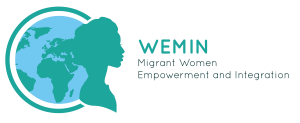 Sharife is a woman from Afghanistan where, before leaving, she had a comfortable life and even operated her own business. However, in January 2016, due to safety problems in her country, she and her husband made a decision to leave the country with their children and to reach Germany.
Sharife is a woman from Afghanistan where, before leaving, she had a comfortable life and even operated her own business. However, in January 2016, due to safety problems in her country, she and her husband made a decision to leave the country with their children and to reach Germany.
Learn more about Sharife’s story here.
WEMIN at the «You and I, and those who came after-We are all citizens» event
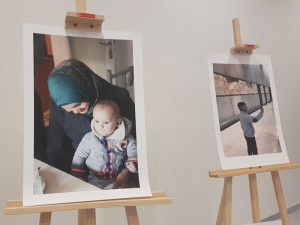 On the occasion of the “World Refugee Day“, an event entitled “You and I, and those who came after-We are all citizens” took place at the Serafion Center of the Municipality of Athens (22 June 2019). Humanitarian organizations, self-governing bodies and migrant-refugee communities as well as many citizens participated in the event which was open to the general public. Among them were the WEMIN implementation bodies in Greece, HOU-DAISSy Research Group (Coordinator) and Olympic Training & Consulting Ltd (partner).
On the occasion of the “World Refugee Day“, an event entitled “You and I, and those who came after-We are all citizens” took place at the Serafion Center of the Municipality of Athens (22 June 2019). Humanitarian organizations, self-governing bodies and migrant-refugee communities as well as many citizens participated in the event which was open to the general public. Among them were the WEMIN implementation bodies in Greece, HOU-DAISSy Research Group (Coordinator) and Olympic Training & Consulting Ltd (partner).
For more Info, please check “here“.
The Mu.SA project in the International Conference in Information, Intelligence, Systems and Applications, Greece 2019
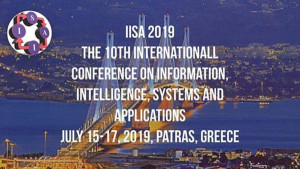 The Mu.SA project was presented in the 10th International Conference in Information, Intelligence, Systems and Applications (IISA2019) in the 15th of July 2019 at the University of Patras, Greece.
The Mu.SA project was presented in the 10th International Conference in Information, Intelligence, Systems and Applications (IISA2019) in the 15th of July 2019 at the University of Patras, Greece.
IISA-2019 is the tenth conference in the IISA series, technically co-sponsored by IEEE, the University of Piraeus, the University of Patras and the University of the Peloponnese.
The International Conference on Information, Intelligence, Systems and Applications (IISA) series offers a forum for the constructive interaction and prolific exchange of ideas among scientists and practitioners from different research fields such as computers, mathematics, physics, biology, medicine, chemistry, experimental psychology, social sciences, linguistics, and engineering; having the goal of developing methodologies and tools for the solution of complex problems in artificial intelligence, biology, neuroscience, security, monitoring, surveillance, healthcare, sustainability in energy sources, governance, education, commerce, automation, robotics, optimization, image, speech and natural languages, and their integration.
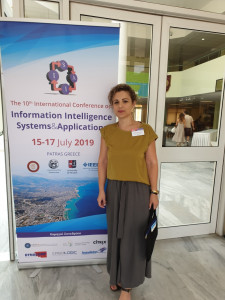 The paper entitled “Implementing a MOOC course for Museum Professionals with a worldwide effect” was presented by Mrs Panagiota Polymeropoulou, Researcher of the DAISSy Research Group of Hellenic Open University. The participants to the session “E-Learning Systems” were very interested to learn more about the Mu.SA project, the training program, the outcomes, the four role profiles as well as the results and the worldwide participation to the MOOC “Essential Digital Skills for Museum Professionals”. In the paper are described the Methodology for designing and developing the modular online course as well as the European Frameworks of e-CF and DigComp adapted to the museum sector’s professionals knowledge and training. In the paper are presented also, in numbers and graphs the results of providing the MOOC, open to museum professionals participating from all the world. The paper will be published in the IEEE Xplore series.
The paper entitled “Implementing a MOOC course for Museum Professionals with a worldwide effect” was presented by Mrs Panagiota Polymeropoulou, Researcher of the DAISSy Research Group of Hellenic Open University. The participants to the session “E-Learning Systems” were very interested to learn more about the Mu.SA project, the training program, the outcomes, the four role profiles as well as the results and the worldwide participation to the MOOC “Essential Digital Skills for Museum Professionals”. In the paper are described the Methodology for designing and developing the modular online course as well as the European Frameworks of e-CF and DigComp adapted to the museum sector’s professionals knowledge and training. In the paper are presented also, in numbers and graphs the results of providing the MOOC, open to museum professionals participating from all the world. The paper will be published in the IEEE Xplore series.
Pre-Selection For Specialization Course Candidates Has Finished!
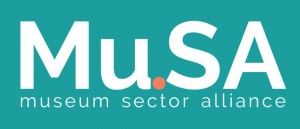 We are happy to inform you that the pre-selection procedure for the participation to the Mu.SA Specialization course has finished and the pre-selected candidates per country (Greece, Italy, Portugal) have been informed through email. Due to the GDPR law, the details of the pre-selected candidates will not be announced publicly. Totally, only 120 candidates are selected to continue with the Specialization Course in the Mu.SA project countries. The Specialization course will start in 16 September 2019 and end on 13 March 2020.
We are happy to inform you that the pre-selection procedure for the participation to the Mu.SA Specialization course has finished and the pre-selected candidates per country (Greece, Italy, Portugal) have been informed through email. Due to the GDPR law, the details of the pre-selected candidates will not be announced publicly. Totally, only 120 candidates are selected to continue with the Specialization Course in the Mu.SA project countries. The Specialization course will start in 16 September 2019 and end on 13 March 2020.
We would like to thank all candidates who took time and submitted their Expression of Interest for the Mu.SA Specialization Course! We remind you that this is a pilot specialization course that we hope to develop it to a permanent course, and we shall inform you when a new Mu.SA Specialization Course is announced.
Once more, we would like to thank you all for supporting the Mu.SA project and we are looking forward to see you in a new course!
Εκδήλωση διαβούλευσης για τα αρχικά αποτελέσματα του έργου ΜΙLE
Το ΕΑΠ – Ερευνητική Ομάδα DAISSy διογανώνει εκδήλωση διαβούλευσης σχετικά με τα αρχικά αποτελέσματα του έργου MILE, η οποία θα πραγματοποιηθεί τη Δευτέρα 15 Ιουλίου 2019, 16.00 μ.μ.-19:00 μ.μ., στις εγκαταστάσεις του ΕΑΠ, Αθήνα (οδός Γραβιάς 4-6, 1ος όροφος, αίθουσα εκδηλώσεων). Η εκδήλωση θα περιλαμβάνει παρουσίαση των στόχων και ειδικότερου περιεχομένου του έργου MILE, καθώς και συζήτηση με τους εκπροσώπους φορέων σχετικά με τους άξονες της απασχόλησης και κοινωνικής συμμετοχής των Υπηκόων Τρίτων Χωρών (ΥΤΧ) στις κοινωνίες υποδοχής. Για περισσότερες πληροφορίες, πατήστε “εδώ”.

Training of museum professionals and developing digital skills in Greece
 The DAISSy research team of the Hellenic Open University, organized with great success the event focusing on the “Training of museum professionals and developing digital skills”, on Monday 24 of June 2019 at the hotel Electra Metropolis in Athens, with speeches by the Hellenic Committee of the International Council of Museums (ICOM) and IEK AKMH, partners of the Mu.SA project. The subject of the event was to present the training activities organized within the framework of the European project. The event was organized within the framework of the European Project Mu.SA – Museum of Alliance, funded by the Erasmus + / Sector Skills Alliance, coordinated by the DAISSy research team, Hellenic Open University.
The DAISSy research team of the Hellenic Open University, organized with great success the event focusing on the “Training of museum professionals and developing digital skills”, on Monday 24 of June 2019 at the hotel Electra Metropolis in Athens, with speeches by the Hellenic Committee of the International Council of Museums (ICOM) and IEK AKMH, partners of the Mu.SA project. The subject of the event was to present the training activities organized within the framework of the European project. The event was organized within the framework of the European Project Mu.SA – Museum of Alliance, funded by the Erasmus + / Sector Skills Alliance, coordinated by the DAISSy research team, Hellenic Open University.
The aim of the project is to bridge the gap between formal education and the labor market, a gap that has arisen due to the ever-increasing introduction of Information and Communication Technologies (ICT) in the museum sector and the subsequent emergence of new specialties. The project investigates the training opportunities provided for digital and transferable skills for museologists, cultural professionals and students and their practical application level, designed and implemented by Mu.SA partnership like MOOC, specialization courses and work – based learning. The consortium comprises a total of 11 partners from 4 countries (Greece, Italy, Portugal, Belgium), coordinated by the Hellenic Open University and the Scientific Coordinator of Achilleas Kameas, Professor, Hellenic Open University.
The aim of the event was to present the research’ results and the activities of the project Mu.SA, the detailed description of the 4 role profiles as well the overview of Mu.SA’s Massive Open Online Course (MOOC) with the title “Essential skills for Museum Professionals”. The MOOC was offered in the first quarter of 2019 with more than 5,000 entries from culture and museum professionals worldwide.
During the event were awarded the Certificates to those who had successfully completed the MOOC.
The second part of the event included speeches by representatives of the cultural sector such as the Vice –president of ICOM GR, the Head of Directorate for the Administration of the National Monument Archives, Hellenic Ministry of Culture and Sports, and a museologist – board member of a company in culture, who expressed their thoughts on the continuous, professional training in the field of cultural heritage in Greece. The event closed with the presentation by IEK –AKMI, partner of the project, who presented to the audience the content and the aims of the specialization in each of the 4 profiles of the Mu.SA project through the Specialization courses that will be available for 120 selected from Greece, Italy and Portugal. There followed a brief discussion with the public.
The event was a major success, attracting more than 70 participants frοm the cultural sector, museum working personnel and those who are interested to continue their training in Mu.SA. The participants had the opportunity to exchange ideas and practices on the professional and organizational development of cultural operators, tackling the lack of digital skills, the importance of training programs such as the one offered by Mu.SA and the need to continue this program in the coming years due to its great response.
The event was videotaped and will be available through the DAISSy YouTube channel, along with mini interviews with students who successfully completed MOOC.
The Linguacuisine ‘LinguaChef’ Prize
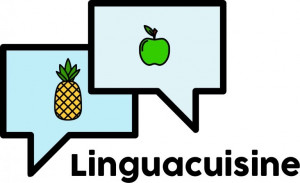 The LinguaChef Prize will be awarded to the person who uploads the best language learning recipe using the Linguacuisine recipe author software during the period 14 June to 31 August 2019. The prize consists of a payment of £200 plus a LinguaChef Gold Certificate. There are 2 runner-up prizes with £50 each plus a LinguaChef Silver Certificate. All will feature on the front page of all Linguacuisine media and the recipes will be promoted around the world on the website.
The LinguaChef Prize will be awarded to the person who uploads the best language learning recipe using the Linguacuisine recipe author software during the period 14 June to 31 August 2019. The prize consists of a payment of £200 plus a LinguaChef Gold Certificate. There are 2 runner-up prizes with £50 each plus a LinguaChef Silver Certificate. All will feature on the front page of all Linguacuisine media and the recipes will be promoted around the world on the website.
The language learning recipe can involve learning any language and any recipe. There is no cost to making an entry.
To enter for the LinguaChef prize:
- Watch the video tutorial on how to create your own language learning recipe on https://linguacuisine.com/tutorials/
- Read the advice on http://linguacuisine.com:8000/ by pressing the ? icon on the main page.
- For an example of a good language learning recipe, try Italian Involtini.
- You need a googlemail account to use the recipe author software.
- Gather your ingredients and cooking equipment as well as your recording equipment, cook the meal and record your recipe.
- Enter your video and audio files, photos and text using the recipe author software to form a complete recipe.
- If you wish, you can add extra media and text under the titles ‘full length recipe’, ‘culture and history’, ‘language’ and ‘cuisine’ to provide additional learning materials in relation to your recipe.
- Tick ‘publish’ on the main page when the recipe is finished.
- When you see your recipe appear on the recipe player http://linguacuisine.com:7000/ this means that you have successfully uploaded your recipe. It may take a day to upload onto the server.
- Then email us on linguacuisine@gmail.com to say you wish to enter the 2019 LinguaChef contest. Give us a) your name b) the name and language of your recipe c) your preferred email address for contact.
Entries will be judged during September 2019 and the winner and runner-up announced on 30 September 2019.
The criteria for evaluating the language learning recipes will be:
- How easy is the recipe for learners of the language to follow and to create the dish?
- To what extent does the recipe help users learn aspects of the language, culture and cuisine?
- What is the quality of the video and audio files, photos and text in relation to learning this language, culture and cuisine?
Entry to the competition is open to all and is free. However, staff of Newcastle University, Action Foundation and the Workers Educational Association may not enter or contribute to any entries.
Information is on https://linguacuisine.com/linguachef/


